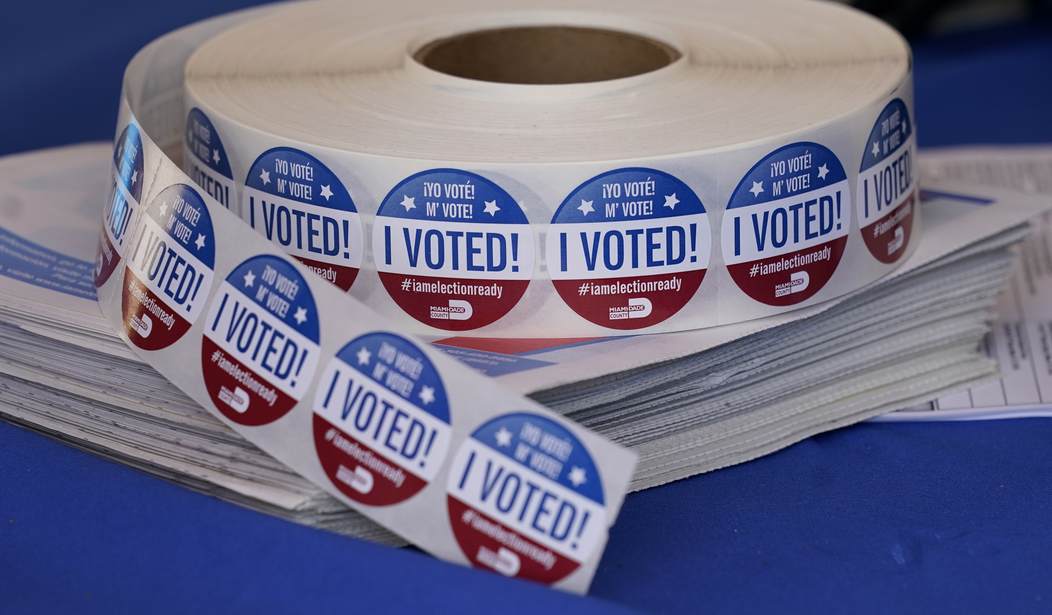The Democrats and many of their allies in the mainstream media portray voting legislation, which they claim is necessary to protect voting rights, as one of the most important issues facing us today. A recently released poll, however, shows that the American public is actually not as worried about the issue as we're being led to believe.
Earlier this month, the AP-NORC released the results of a poll conducted last month, detailing the thoughts of Americans on issues like the state of democracy and voting in the United States. There is a particularly key point mentioned in the poll's write-up, though.
"Seventy-four percent of the public think voting is neither too easy nor too difficult, although Black Americans are more likely to say voting in their state is too difficult. Twenty-three percent of Black Americans say voting in their state is too difficult, compared with 15% of Hispanic Americans and 11% of white Americans," it reads at one point.
If close to three-quarters think the difficulty level of voting is just right, it's worth wondering why the Democratic Party has made it such a pressing issue. Why look to create a solution to a problem that doesn't actually exist, certainly not as the Democrats frame it.
In writing about the poll for The Washington Examiner, Timothy Carney offered that "It just goes to show you that if Democrats make something about race, they can get the media to go along with any silliness and that corporate America will follow."
Recommended
Worse, the so-called "voting rights" bills that Democrats passed in the House and even tried to change the rules to nuke the filibuster in order to get them passed in the Senate would create further problems.
Such unconstitutional bills would lead to the federal takeover of elections in a fierce disruption of federalism and the separation of powers. Particularly unconstitutional though one of those bills, HR 1/S 1, was considered, it would still be particularly difficult to challenge in court, as Honest Elections Project's Jason Snead highlighted in a conversation with Townhall last April.
Who can forget the vicious verbal attacks from President Joe Biden himself, who in a speech he gave in Atlanta in January compared Republicans who weren't on board with such legislation to racists and segregationists such as Jefferson Davis, Bull Connor, and George Wallace? Biden and the White House claimed otherwise, though, and tried to downplay such rhetoric, before admitting they had gone too far.
Just in time for the January 6 anniversary, an editorial from The New York Times editorial board on January 1 claimed that "Every Day Is Jan. 6 Now," equating the events of the Capitol riot with voter integrity legislation being considered and passed in state legislatures across the country.
In a letter to his colleagues that same month, Senate Majority Leader Chuck Schumer (D-NY) also made the same connection. He warned his fellow senators that if they could not pass legislation such as the John Lewis Voting Rights Act, then they would vote to change the filibuster. That effort also ultimately failed when moderate Democrats, Sens. Joe Manchin (WV) and Kyrsten Sinema (AZ) voted against doing so. They had voted with their fellow Democrats in favor of the voting legislation, but were not willing to alter the filibuster so radically to do so.
Such legislation that Democrats have been so determined to get passed would also impact voter ID by rendering it moot in states where it's passed. Told you this was a federal takeover of elections. This is despite how popular voter ID is.
Speaking of the AP-NORC poll once more, it notes that "When it comes to changes to voting regulations, most Americans, regardless of party, favor requiring photo identification to vote." It's worth emphasizing that the phrasing here is photo ID, and not merely a form of ID such as a bill that some states with more relaxed laws let voters present with to prove their identity.
The breakdown for such a voter ID question is that it has the support of 70 percent of Americans overall, including 87 percent of Republicans, 71 percent of Independents, and 55 percent of Democrats.
This poll was conducted February 18-21 with 1,289 adults and a margin of sampling error of plus or minus 3.7 percentage points. It was particularly high with the 301 Black adults surveyed, at plus or minus 7.2 percentage points.
Other polls which have examined what issues Americans care about have also shown voting legislation to not be a priority.
A Quinnipiac poll from February, for instance, showed that 8 percent of adults chose "Election Laws" as their most important issue. For Gallup, the issue of "Elections/Election reform" was an asterisk for February 2022, meaning less than 0.5 percent of adults chose it. Even in January 2022 and December 2021, when the White House was pushing it more so, it was still just at 1 percent. It wasn't even listed in a poll from the Pew Research Center conducted in January and released shortly before Biden's State of the Union address that was delivered on March 1.

























